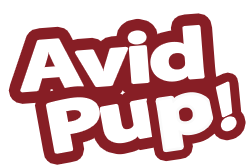
For most puppy owners, the primary concern is to prevent weight gain. In fact, if you do a quick search for high-calorie dog food to help a puppy gain weight, you’ll be hard-pressed to find many options.
This can make it tough to help an underweight puppy get healthy. With that being said, there are many great puppy foods out there. You just have to look a little harder.
High-calorie puppy foods can support your dog’s development and bring them back to a healthy weight. While some may think that pumping their pup full of fatty foods will do the trick, this can do more harm than good.
Gaining weight needs to be done in a healthy manner with high-calorie foods or supplements.
5 of the Best High Calorie Puppy Foods & Supplements for Weight Gain
#1. Adirondack Pet Food 30% Protein High-Fat Recipe For Puppy & Performance Dogs
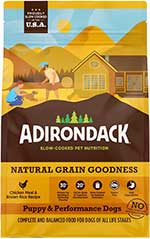
This formula from Adirondack is great for growing puppies. It’s made up of 30 percent protein. Most of that protein comes from chicken meal and fish meal. It also has plenty of healthy fat.
Chicken fat and beneficial fish oil are used to give your dog a boost of weight-gaining fat and omega fatty acids. Some things you won’t find in this recipe are corn, wheat, or soy. Instead, it’s filled with healthy ingredients like flaxseed, barley, and brown rice.
The manufacturers also included many supplementary vitamins and nutrients to make sure that your puppy is getting everything they need to gain weight.
#2. Bully Max High Performance Super Premium Dog Food
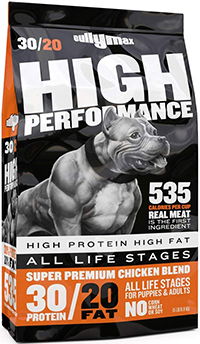
The Bully Max high-performance dog food is designed to help your puppy reach their full potential. It’s a meat-based formula that’s comprised of 30 percent protein.
High-quality ingredients like chicken meal and fish meal are used to provide your dog with a complex profile of amino acid. This dry kibble is also made up of 20 percent fat.
Chicken fat and fish oil are used. The fish oil gives your dog a healthy dose of Omega 6 and Omega 3 fatty acids. In total, this recipe has about 535 calories per cup.
#3. Purina Pro Plan SPORT Performance 30/20 Formula Dry Dog Food
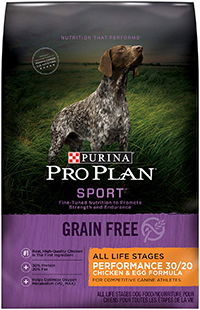
From Purina is this Sports Performance dog food. It’s formulated to help your dog develop strong muscles and healthy body weight. It has about 30 percent protein and 20 percent fat.
The protein comes ingredients like real chicken. Fish oil and beef fat are used as fat sources. The formula is very rich in nutrients. There are no unnecessary fillers like corn, wheat, or soy. Instead, it provides a balanced diet that can help your puppy bulk up.
It also has antioxidants to support your puppy’s developing immune system.
#4. MVP K9 Supplements Formula Mass Weight Gainer for Dogs
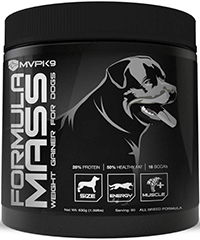
This product from MVP K9 Supplements is specifically designed to help dogs gain weight. The powder supplement can be sprinkled onto your puppy’s standard food to give it a boost in protein and calories.
Each scoop is made up of about 28 percent protein and 50 percent fat. All of the ingredients are tested for safety, so you can rest assured that your dog is only consuming beneficial ingredients.
It can help your pup pack on the pounds without having to switch foods. The powder is formulated to be appetizing for all dog breeds.
#5. Tomlyn Nutri-Cal High Calorie Nutritional Gel for Puppies
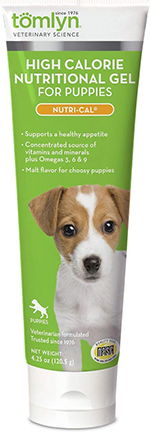
If you have a picky eater, consider the Nurti-Cal gel from Tomlyn. It’s a supplement that’s formulated to taste great. Your dog will have no problem eating their food once this gel is mixed in.
The gel is made up of predominantly fat. Fat makes up approximately 30 percent of the recipe. In addition to helping your puppy bulk up, the gel can be used to provide your pup with a boost of vitamins and minerals.
It contains everything from Omega Fatty acids to Vitamins A, D, and E.
Why is My Puppy Underweight?
There are a number of reasons why your young puppy may be underweight. It’s important that you monitor their behavior and eating habits closely.
Sometimes, you can find a solution by simply watching their behavior and making a few modest changes. Other times, it may be caused by an underlying health problem.
Either way, it’s always recommended that you consult with a veterinarian. They can diagnose the problem and guide your puppy in the right direction.
Not Eating
The simplest reason why your puppy isn’t gaining weight is that they’re not eating their food. Young puppies may not eat due to stress. This is very common in the first couple of weeks at their new home.
They’re surrounded by new things and they’re going through new experiences. It’s a stressful time. This can lead to appetite issues.
The best thing you can do is to support your puppy and make them feel welcome.
Introduce them to their home and offer them plenty of praise around meal time. Some owners may notice weird quirks about their puppy.
For example, some young dogs won’t eat if their food is in a bowl because they’re not used to it. If that’s the case, accommodate their needs while they gain weight. You will need to address the problem, but making your puppy healthy is the first priority.
Health Issues

Puppies are prone to a range of health conditions. Some canines will inherit medical issues from their mothers while others will come down with an illness shortly after birth.
Their immune systems aren’t that strong. If your puppy is younger than 16 weeks of age, they probably haven’t received all of their vaccinations either.
Worms are one of the most common issues that affect weight. Puppies can get worms in the womb. While worms aren’t particularly life-threatening to an adult dog, they can wreak havoc on a puppy’s body.
Some species, such as tapeworms and roundworms, will leach off of their gastrointestinal tract. These parasites can consume essential nutrients in your dog’s body.
While your pup may be eating large meals, a lot of that nutrition is lost to the worms.
Luckily, worms are relatively easy to treat with a simple dewormer.
Liver disease and thyroid complications may also be the culprit. The liver plays a crucial role in how their body deals with nutrients. Issues can result in missed nutrients.
The body will start to use up fat reserves, leading to weight loss.
Thyroid problems increase your pup’s metabolism, causing them to lose weight rapidly. These are just a few health issues that can prevent weight gain. If you suspect that a medical problem is to blame, take your puppy to a vet as soon as possible.
Dental Pain
Dental pain can be tough to spot if you’re not constantly looking at your dog’s mouth. Even young puppies will hide their pain.
Your new canine companion could be suffering from a dental infection or abscess. These issues are very painful. As a result, your puppy will not want to even attempt eating. To solve dental issues, you’ll need to see a veterinarian.
Not Enough Food
If your puppy is scarfing down everything you put in front of them and is still not gaining any weight, you may want to think about their calorie requirements.
Despite their small statures, puppies need a lot of calories to grow.
Their bodies are going through rapid changes. Food is the fuel to support those changes. Your dog may be experiencing a calorie deficit.
Essentially, they’re not eating enough food to supplement the calories they burn every day.
You’ll need to figure out your dog’s daily calorie requirements and proceed from there. To do so, you’ll have to monitor their weight regularly, check out some information about their breed, and consult with a vet.
The Body Condition Test
Canine bodies hold weight differently than human bodies do, so it can be a bit difficult to tell if a dog is underweight. Not only that, but different breeds have distinct body compositions and thick hair that masks the problem further.
To check if your dog is underweight, you can take a look at their overall body condition.
Veterinarians check body condition regularly. It gives you a good idea of your pup’s overall health. You’ll need to take a look at their body shape from above, check their side profile, and feel their torsos. Here are a few symptoms to look for.
Slightly Underweight
Slightly underweight dogs aren’t at an immediate risk for problems. However, they may be processing calories faster than they’re consuming them. Either way, you’ll need to address the problem to prevent your dog from falling further down the scale.
When you look at your dog from above, you will be able to see a clear definition around the waist. You may also be able to feel the ribs under the skin.
Underweight
Underweight dogs have a noticeably sunken stomach. You will also be able to see the ribs through the skin. Unwanted definition around the hips and shoulders may also be present
Severely Underweight
If your dog is severely underweight, you’ll be able to see virtually every bone that makes contact with the skin.
Their stomach will be severely sunken in and their muscles may look a bit concave. In terms of behavior, your dog may also show signs of lethargy.
Emaciated
At this point, your dog needs to seek emergency care. Emaciated dogs are at a high risk of experiencing health issues, like organ failure. Your dog’s bones will be even more defined if they’re emaciated.
Even their facial bones will stick out. They’ll also be very tired and may not show any signs of mental awareness.
The Importance of Healthy Weight Gain
There’s a fine line between healthy weight gain and unhealthy weight gain. As mentioned earlier, puppies are at a very vulnerable point in their lives.
They need a lot of food to develop their bones and muscles. However, too much food can lead to even more problem.
Your dog needs to gain weight gradually and in a healthy manner. Otherwise, they may start to experience abnormal growth patterns, skeletal issues, organ failure, and much more.
High-calorie foods are designed to help your puppy. The ingredients in these formulas are chosen because they can benefit your puppy. The worst thing you can do is load them up on useless filler or fatty foods.
Sure, this will lead to an increase in body weight. However, the weight will be in the form of body fat. High-calorie foods let your dogs develop strong muscles and bones at a healthy pace.
Things to Look For
When you’re shopping for high-calorie puppy food, it’s imperative that you check with the ingredients list.
You need to invest in a quality food that’s chock-full of beneficial ingredients. Here are some things to look out for.
More Protein
Remember, you want your puppy to gain meaningful body weight.
They need to develop muscles. Most puppy foods will have a slightly higher protein content than their adult counterparts. If you want your dog to gain weight, the protein content needs to be even higher.
Protein has amino acids that will support their muscles as they grow up. Look out for identified lean sources. These include ingredients like beef, chicken, bison, fish, and more.
Less Filler
Cheaper foods utilize fillers like corn, wheat, and soy. They add some bulk to the food so that your dog will feel full. However, they aren’t useful in the body.
They hold virtually no nutritional content. They’re empty calories that are converted to energy quickly.
Avoid foods that contain unnecessary fillers and go with options that are nutritionally dense. A high-calorie food should have more protein and fewer simple carbohydrates.
Healthy Fats and Complex Carbohydrates
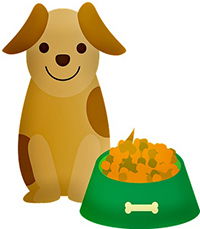
Complex carbohydrates are always preferred over simple ones. They’re converted into energy slowly and decrease your pup’s chances of getting diabetes.
Not only that, but many complex carbohydrates are full of nutrients that can help them gain weight.
Sweet potatoes are one of the best ingredients to get. They can help your pup pack on the pounds. It also has a lot of fiber to prevent stomach issues.
When it comes to fat, keep things healthy. Identifiable animal fats are great for your puppy. If you want something even better, go with a puppy food that has salmon or flaxseed oil.
They have more calories than randomly added fat. Plus, they can keep your dog’s skin healthy.
Another healthy fat is pumpkins. Pumpkins are fatty fruits that are filled with healthy nutrients.
Over to You
It can be tough to watch your young pup suffer from the effects of being underweight. You can do your part to help your dog get healthy by providing them with a high-calorie dog food.
With the right formula, your dog can get back to a healthy weight range and continue to develop into a thriving adult.
Also Read: How Much Should you Feed a Pup on a Raw Dog Diet?

